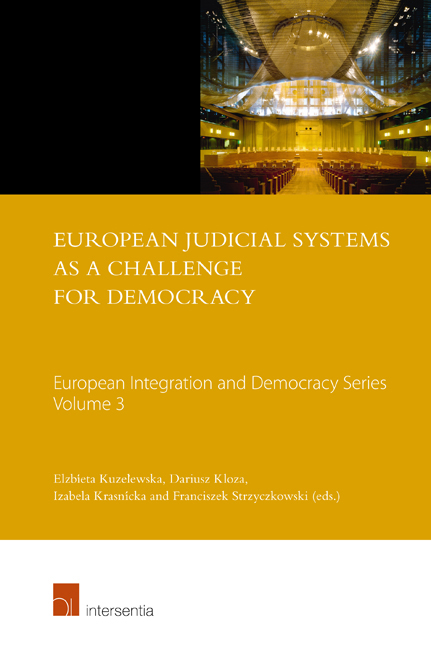Book contents
- Frontmatter
- Foreword
- Preface
- Contents
- List of Abbreviations
- PART ONE THE COURT OF JUSTICE OF THE EUROPEAN UNION
- 1 Democracy in Constitutional Politics of European Courts: An Overview of Selected Issues
- 2 The Institutional Balance as CJEU's Contribution to Democracy in the Union: Selected Issues
- 3 From Judicial Dialogue Towards Constitutional Spill-Over? The Economic Analysis of Preliminary Reference Procedure and the Application of the EU Charter of Fundamental Rights
- 4 Towards the Democratization of the EU? Strengthening prerogatives of the European Parliament in the case law of the Court of Justice of the European Union
- 5 Democratic Values in the Court of Justice Adjudication on the Private Enforcement of the European Union Competition Law
- 6 Judicial Control of Monetary and Fiscal Decisions in the European Union
- 7 How CJEU's “Privacy Spring” Construed the Human Rights Shield in the Digital Age
- 8 The Supremacy of the EU Law as Interpreted by the Polish Constitutional Tribunal
- 9 Reception of EU Law in Polish Courts – A Case of “Teddy Bear” Law
- 10 Enforcing Europe's Foundational Values in Central and Eastern Europe: A Case in Point
- PART TWO THE EUROPEAN COURT OF HUMAN RIGHTS
9 - Reception of EU Law in Polish Courts – A Case of “Teddy Bear” Law
from PART ONE - THE COURT OF JUSTICE OF THE EUROPEAN UNION
Published online by Cambridge University Press: 15 December 2017
- Frontmatter
- Foreword
- Preface
- Contents
- List of Abbreviations
- PART ONE THE COURT OF JUSTICE OF THE EUROPEAN UNION
- 1 Democracy in Constitutional Politics of European Courts: An Overview of Selected Issues
- 2 The Institutional Balance as CJEU's Contribution to Democracy in the Union: Selected Issues
- 3 From Judicial Dialogue Towards Constitutional Spill-Over? The Economic Analysis of Preliminary Reference Procedure and the Application of the EU Charter of Fundamental Rights
- 4 Towards the Democratization of the EU? Strengthening prerogatives of the European Parliament in the case law of the Court of Justice of the European Union
- 5 Democratic Values in the Court of Justice Adjudication on the Private Enforcement of the European Union Competition Law
- 6 Judicial Control of Monetary and Fiscal Decisions in the European Union
- 7 How CJEU's “Privacy Spring” Construed the Human Rights Shield in the Digital Age
- 8 The Supremacy of the EU Law as Interpreted by the Polish Constitutional Tribunal
- 9 Reception of EU Law in Polish Courts – A Case of “Teddy Bear” Law
- 10 Enforcing Europe's Foundational Values in Central and Eastern Europe: A Case in Point
- PART TWO THE EUROPEAN COURT OF HUMAN RIGHTS
Summary
INTRODUCTION
Czesław Miś (Czesław Teddy Bear when you translate his last name into English) is a Polish doctor of paediatrics who works at a state hospital in Nowy Sącz, a town located close to the city of Kraków in Poland.
The story of his court proceedings serves as an excellent example of and reflection on the practical application of two fundamental principles of the European Union law: supremacy and direct effect in the cases heard by the national common courts. The story should be known not only by lawyers and legal theorists. It should and has been also heard generally by the EU citizens. These citizens sometimes still believe that EU law made “out there in Brussels” is law with little or even no concrete, meaningful rights for individuals such as Kowalski in Poland or Sanchez in Spain. Moreover, the same citizens believe that Kowalski and Sanchez have limited or no chances in winning their case while battling for those limited rights in their national courts.
This paper will introduce the case, analyse the legal grounds for Czesław Miś’ claims and most of all, focus on the arguments and reasoning of the Polish common courts hearing the case with specific dynamics of understanding and recognition of the EU law principles as explained by the European Court of Justice (ECJ). It should serve as a comprehensive story, useful for full explanation of the principles working or not working in practice of domestic courts.
THE PRINCIPLE OF SUPREMACY, THE PRINCIPLE OF DIRECT EFFECT AND THE PRINCIPLE OF INDIRECT EFFECT OF EU LAW
The principle of supremacy (primacy) and the principle of direct effect of EU law have been developed by the European Court of Justice as they are not expressis verbis included in the texts of the two main EU Treaties, that is the Treaty on the Functioning of the European Union and the Treaty on European Union. Both principles have been extensively analysed in the literature, therefore comments presented below aim to shortly summarize their significance in the ongoing, dynamic relationship between the unique legal order of the European Union and different internal legal orders of the Union's Member States.
- Type
- Chapter
- Information
- European Judicial Systems as a Challenge for Democracy , pp. 143 - 158Publisher: IntersentiaPrint publication year: 2015



